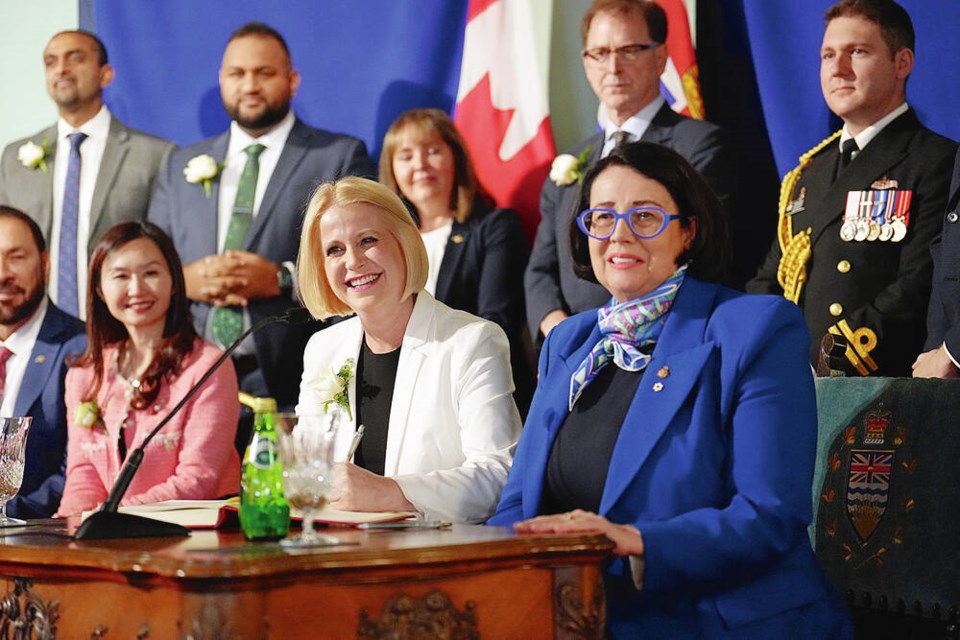The B.C. minister of Education’s portfolio is a whopper, with a budget of $9.6 billion projected for the 2024/25 school year.
At last count, there were 1,586 active public schools and 364 active independent schools in B.C., with 577,024 students in public schools and 86,201 in independent schools.
Independent schools receive ministry funding and are accountable to the ministry for the delivery of the B.C. curriculum.
Newly appointed Education Minister Lisa Beare faces a formidable task, the demands of which far exceed any of her previous organizational or political experience as a school trustee, minister of Tourism, Arts and Culture and minister of Citizens’ Services.
It’s an impressive background, but for me and others who follow developments in secondary education, one of her most impressive accomplishments was as student body president at Thomas Haney Secondary School in Maple Ridge, one of B.C’s — if not Canada’s — most progressive and visionary secondary schools.
I say that because Thomas Haney Secondary, as well as being a self-directed-learning public high school, features a leadership program that includes areas such as communication, team building, team delegation, organization, self-awareness, goal setting and problem solving.
Minister Beare left her mark there and was, according to those there at the time, widely admired by her teachers and principal.
Not a bad preparation for someone who will eventually assume the leadership of public education in B.C.
Right out of the gate, it will be Minister Beare’s task to begin work on Premier David Eby’s election promises for public education. The premier, pre-election, spoke of his commitment to putting educational assistants in Grade 1-3 classrooms and to providing a mental-health counsellor in every school.
Beyond that, the new minister will hopefully be developing a plan for the introduction and implementation of AI programs like Chat GPT into teaching practice.
That will be something like trying to put a bridle on a bolting horse. It may require the development of a specific branch of the Ministry of Education, or even a round table of educators and technology professionals, to research and develop workable policy to gain some control over that bolting horse, which has already kicked down the classroom barn door and, riderless, is halfway ‘round the K-12 course.
It may be time, and I’m quoting here from one of my own 2022 columns, for an updated look at public education in B.C. by examining what has changed in B.C.’s school districts and classrooms since the July 15, 1988, Sullivan Commission report.
It’s 36 years since Commissioner Barry Sullivan travelled across B.C., and held 66 public hearings and 54 meetings with teachers, and took part in 23 student assemblies.
All told, as Sullivan wrote in his report — called A Legacy for Learners: Report of the Royal Commission on Education — the commission received almost 2,350 written and oral submissions from individuals and groups all over the province.
That’s a pretty fair sampling of opinion about the direction in which those who participated hoped public education would be heading.
So what happened?
Again, maybe what is needed in 2024 is for an apolitical group of practising educators (and that’s an important caveat) to focus on current realities rather than the political opportunism and personal agendas that side-tracked the possibilities promised by the 1988 report.
Fortunately, Minister Beare is not inheriting a system in a shambles. Quite the contrary.
The Program for International Assessment (PISA) 2022, which measured 15-year-olds’ ability to use their reading, mathematics and science skills and knowledge to meet real-life challenges, indicated that B.C. students continue to perform among the best in the world in reading, mathematics and science.
In fact B.C. students not only performed at the 91原创 average but scored well above the OECD average in all three domains.
While B.C. students continue to perform at a comparatively high level, there is some decline from the previous assessment in these results, which is a global trend following the pandemic.
Why? It’s a question that needs to be answered, not by would-be critics of the public system, but by people who know what they are talking about.
For a new minister who seems ready to inject a breath of fresh air into the system, there is plenty to do.
Talking about new beginnings is to invite cliché, but as Eleanor Roosevelt is quoted as saying: “With the new day comes new strength and new thoughts.”
Geoff Johnson is a former superintendent of schools.



